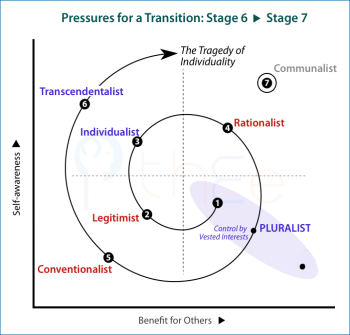Political Transition #6
Recognition of Needs

The willingness for change pursued in terms of commonality («what we all want») in the will be organized in terms of individuality («what I deeply believe») in the .
However, until this point, the has not been handled in terms of our initial assumption of what governing society should be about: «what each and all need».
The primary issue in relation to «need» is the extreme inequality amongst people. Inequality here means «inequality as individuals» i.e. individuality = inequality.
Moving from of and a severe inequality of classes to the depended on the valuable notion of «equality under the law». This equality is too often extended via socialist ideology to suggest an impossible ideal of economic equality.
The generated inequality of a new sort: one based on the capacity to accumulate wealth through personal enterprise. To counteract this, «equality of opportunity» becomes an essential requirement of governance.
The tackles the effects of unrestrained commercial exploitation. In an official inquiry, no-one who is affected by the issue should be excluded from providing an input personally or via a representative. So this is a new «equality of relevance».
The has as its core value. However this stemmed from «equality of responsibility» for society and for the professional functioning of its politicians and bureaucrats.
The tears down many of the former shibboleths and delusions about people and society. While there is an «equality of uniqueness», this starkly clarifies just how different (i.e. unequal) people are in their endowments, mentalities and capabilities, not to mention their wishes, interests and hopes.
This awareness of inequality via individuality is what produces a tragedy.
The Tragedy of Individuality
When inequality is viewed as a manifestation of individuality, and each person is treated as valuable in their own distinctive way, a rich social life is fostered at the same time as personal identity is strengthened.
The fosters the valuation of uniqueness and rejects submergence of personal identity within an ideology, class or group. However, society will inevitably fail to appreciate or respond fully to certain of its members. The inherent difficulty in celebrating every manifestation of beneficial uniqueness might well be termed at that future time: «The Tragedy of Individuality».
The climate will be ready for when the realization dawns that:
- there is and can be no life for any individual outside communities within which they feel they belong; &
- there is and can be no life in any community outside the particular individuals who are able to live and thrive within it.
THEE may be able to make a contribution to the final transition, through its perspectives on reality-creation and personal identity.
The taxonomy affirms that social reality is created by each and all through communication![]() . As the of individuals to determine their own political reality strengthens, the way politicians try to impose narratives convenient to themselves will become more obvious and easier to resist.
. As the of individuals to determine their own political reality strengthens, the way politicians try to impose narratives convenient to themselves will become more obvious and easier to resist.
If people do create psychosocial reality, then the quality of that creation must depend on personal endowments. Those inner endowments (abilities, strengths, virtues) will in turn affect the personal contribution that each can make within a community.
This Taxonomy
- clarifies a richness in the gradations in capabilities
 to carry responsibility and personal orientations essential to a strong society.
to carry responsibility and personal orientations essential to a strong society. - affirms and explains the identity-strengthening and achievement-fostering effect of each person being treated as valuable in their own distinctive way.
- Next step: participation surges with the communalist mode.
Originally posted: July 2009; Last updated: 11-Apr-2014